Screenshot of Tuesday’s Humboldt County Board of Supervisors meeting.
###
During Tuesday’s meeting, the Humboldt County Board of Supervisors unanimously voted, with Second District Supervisor Michelle Bushnell recused, to reinstate the Measure S cannabis cultivation tax at 10 percent for the 2024 cultivation year, with taxes due in the 2025 tax year. Cannabis farmers with outstanding balances will be expected to establish a payment plan with the county by June 30, 2024, to prevent the suspension of their permits.
Bushnell, citing guidance from the Fair Political Practices Commission, said she was obligated to recuse herself from the discussion because of her own cannabis operation. “I have excise tax that is in my name,” she said. “As such, financially, I have a direct interest, so this is the one thing cannabis – and the only thing – that I do have to recuse from.”
The decision to partially reinstate the cultivation tax comes nearly one year after the Board of Supervisors voted to temporarily suspend Measure S taxes for two years to provide relief to hundreds of struggling cannabis farmers.
“This gave a bit of a reprieve for folks to get caught up if they had any outstanding balances … when they were not being assessed any additional excise taxes,” County Administrative Office (CAO) Elishia Hayes said during Tuesday’s meeting. “Furthermore, through collaboration with your Treasurer-Tax Collector … the county is now accepting partial payments and payment plans on outstanding balances.”
Since November 2022, the Treasurer-Tax Collector has collected $514,662, according to the staff report, with six accounts making partial payments to the tune of $27,216. “There are 962 accounts with outstanding balances totaling $14.19 million,” the report continues. “To date, neither the Treasurer-Tax Collector nor [the] Planning and Building Department have taken an adverse (other than assessing penalties) or revocation actions on approved permits for failure to pay Measure S taxes.”
Hayes asked how staff should enforce outstanding tax balances once the tax is reinstated and whether cultivators who owe back taxes should continue to hold a permit.
Speaking during the public comment portion of the meeting, Craig Johnson, co-owner and operator of Alpenglow Farms, asked that the board continue the tax suspension for another two years.
“We’re one of the farms that have paid our taxes in full, and we’re currently current,” he said. “With the [Humboldt County Reform Initiative] HCRI, or Measure A, looming over us for the past year and a half or so, it has really put a freeze on how we pursue and look into our future because it’s uncertain at this time. So, until we can get past that, we really need to put a freeze on this thing until we can figure out how to move forward. … One year is great but we still need to react to the HCRI and, after that, start figuring out our future. So, I’m gonna ask for two years at this moment.”
Measure A, set to appear on the March 2024 ballot, came up several times during Tuesday’s board meeting. If passed, the controversial ballot measure would place new restrictions on commercial cannabis cultivation across the county. Proponents of the initiative believe the added restrictions will promote small-scale farming and environmentally responsible cannabis cultivation practices across the county. However, many local cannabis farmers fear the ballot initiative would decimate their livelihoods and destroy what is left of Humboldt County’s storied cannabis industry.
Ross Gordon, policy director for the Humboldt County Growers Alliance, echoed Johnson’s concerns about Measure A and spoke in favor of an additional one-year suspension of the tax measure.
“Because Measure A is going to be on the ballot in March, we really don’t know the viability of the cannabis industry headed into 2024 and we feel like it provides a really strong reason to sort of kick this conversation into next year and then reconsider,” he said. “On the question of enforcement … we’d ask that you really give cultivators an opportunity to get on a payment plan and that enforcement is reserved for cultivators who are past due who either are not getting on a payment plan or are not following through on a payment plan in good faith.”
Gordon also provided some stats from a recent survey of market conditions. At this time last year, “65 percent of cannabis farmers were selling below cost of production, meaning essentially they were paying money to grow cannabis.” Twenty percent of cultivators were breaking even, and 15 percent were “returning a small profit,” he said.
“If we look at how market conditions have changed over the past year, we do hear anecdotally from some farmers that the market has picked up a little bit, but if you look at the data … the weighted wholesale average for cannabis actually dropped from $815 a pound to $765 a pound in California [between August 2022 and July 2023]. … And, for reference, this is compared to $1,489 a pound in July 2021. We’re still seeing the market cut about in half from where it was at its peak.”
First District Supervisor Rex Bohn also spoke in favor of extending the tax suspension for another year, noting that “there has been a small bit of stability in the industry this year.” He also asked staff to keep permits active wherever possible.
“The people that have stepped up and legally entered the market, we kind of made a contractual agreement with them that we would work with them,” he said. “Not necessarily [for] late payments, but things happen and I would much rather keep those permits active because they’ve got a permit, they’ve actually gone through the lengthy process to become legal. If they have a payment plan in place, suspend for one year and put a payment plan together … I think that would probably be the best option for right now.”
Third District Supervisor Mike Wilson suggested the board partially reinstate the tax at a rate of 10 percent.
“I think that would bring in enough revenue that, actually within a couple of years, we would be able to recoup from some of the losses associated with this, and it would keep people in the process,” Wilson said. “[G]etting people back into [the] system is pretty difficult as we’re seeing today.”
Fourth District Supervisor Natalie Arroyo agreed, adding that a small tax increase could serve “as a nice middle ground” for cultivators and the county.
“I agree that a small percentage – whether that’s 10 or 15 percent – could be something that could help while recognizing that people’s profits have been cut by a significant amount due to the downturn in the industry,” she said, adding that the industry was in a very different place when Measure S was passed in 2016. “I don’t think we can fully defer over and over and over again while still respecting the will of the voters.”
Fifth District Supervisor and Board Chair Steve Madrone also spoke in favor of reinstating 10-15 percent of the tax, adding that the board has a responsibility to balance the county’s budget.
“Our budget this year was $17 million in the hole,” he said. “We took that out of our reserves [which] were only about $27 million. So, we have maybe about $10 million or so left in our reserves. We can’t do that again. … We too have to consider how we’re going to balance our budget.”
Madrone noted that he was never supportive of Measure S because, he felt, the tax should have been imposed on dispensaries rather than cultivators.
“I just think the tax should have never been applied in that way,” he said. “Because the consumer is going to pay that [tax] no matter what. Whether it’s on the farmer or the distributor or the dispensary, the consumers pay for it. And I thought it was quite interesting that when the price of cannabis dropped, in many cases down to $400 or even $200 a pound … the eighths at the dispensary certainly didn’t go down to $5 or $10 an eighth. So who’s making money here? Not the farmers.”
Speaking to the issue of payment plans, Planning and Building Director John Ford said his department “basically stopped” new payment plans because it became “overwhelming” for staff.
“One of [our finance] person’s primary role roles is to make sure invoices are going out and payments are being received,” Ford said. “He was essentially at the counter all day every day working with people to make payments and it just was not getting us where we needed to be until we stopped taking new payment plans.”
CAO Hayes reiterated that cultivators can establish a payment plan with the Treasurer-Tax Collector’s Office.
Bohn made a motion to reenact 10 percent of the cultivation tax and asked staff to come back to the board with a payment plan option that would be more effective. Arroyo seconded the action.
Bohn also asked if staff could impose a deadline for cultivators to establish a payment plan with the county. “[For example], if [they] don’t make a payment within 12 months, we will suspend your license – not cancel – but we will suspend your license till all fees are paid and cultivation will not be able to take place on said parcel.”
Ford reminded the board that staff “does not have the ability to suspend permits.”
“I know this is a bureaucratic thing, but the ordinance does not give us the ability to simply suspend a permit,” he said. “It’s either it’s approved or its revoked.”
Bohn asked if the board could stipulate that permits would be suspended, not revoked, and modify the ordinance as a part of the motion. Ford said yes. Arroyo agreed to the amended action.
The board approved the motion in a 4-0 vote, with Bushnell recused.
Moratorium on Cannabis Permits
The Board of Supervisors also explored the possibility of imposing a moratorium on new cannabis applications. The item, initiated by Supervisor Bushnell, asked the board to consider how interim permits ought to be handled moving forward and whether a moratorium on new cannabis cultivation applications should be implemented.
“The items are really for discussion and information,” Bushnell said. “[T]he state is … going to be closing out some of interim [permits] and I wanted Director Ford to give us an update on that. And, given the narrative [surrounding] the … ballot measure that’s coming in March, the moratorium conversation is more around, what does our board think that looks like? Do we think it is appropriate? Are there new permits coming through?”
Since September of last year, the county has received nine new permit applications, Ford explained in a presentation to the board. Of the 1,281 cannabis cultivation permits that have been issued since legalization, 1,020 remain active. A little over 100 of those permits were canceled or withdrawn, and 155 are considered non-cultivation. There are also 1,312 state licenses in the county which “do not directly correspond to county permits.”
“State licenses would also include interim permits,” he said. “Some people who have an acre could have two medium-sized licenses, so they have multiple licenses for one permit. … We currently have 388 permitted sites that have no state license. That could be because they are not cultivating this year. So, we’re not saying those are out of compliance, they just currently do not have a license.”
There are currently 126 active interim permits in the county, five of which would be subject to new state guidelines.
Starting on Jan. 1, 2024, the state Department of Cannabis Control (DCC) will no longer issue provisional licenses to large-scale cannabis farmers, including outdoor grows with more than one acre of total canopy and indoor/mixed-light grows with more than 22,000 square feet of total canopy. In anticipation of the new state guidelines, the county Planning and Building Department will not renew interim permits for any cultivation that falls into one of these categories, according to the staff report.
Jan. 1, 2025, is the last day for the DCC to renew a provisional license. Jan. 1, 2026, is the last day for any provisional license to be in effect.
Speaking during public comment, Holly Carter, a consultant with Oxalis Services, asked the board to extend the process for interim permits.
“If someone has an interim permit and a state permit that is active, those are two of the major components that [demonstrate that] they are in compliance and working in the legal industry,” Carter said. “I feel sad to hear that people are still having this assumption that there’s a desire to just kick things down the road. If someone applied for a project six years ago and they’re hanging in there, they’re hanging in there for a reason. We’re not looking to drag things out just to pull one over on you.”
Shifting to the moratorium aspect of the discussion, Natalynne DeLapp, Executive Director of the Humboldt County Growers Alliance, encouraged the board to allow for flexibility. “There’s nothing about cannabis that should be set in stone.”
“We do not support closing the door on accepting applications for smaller and medium-sized, – as defined by the state – cultivation,” she continued. “We should continue to provide a pathway forward for legal cultivation to enter the market. If we are going to do a moratorium, keep it simple. Voter initiatives and referendums ought to be a single page or less. If we are going to make amendments to the ordinance that is through a legislative process that would be best done next year.”
Following public comment, Bushnell reiterated that she initiated the item to provide information to the board and local cultivators, adding that the board was not obligated to make a decision on the matter right away.
After a bit of discussion, Bushnell made a motion to accept the report and directed staff to return to the board in the next 60 days with additional information on the subject, with Madrone offering a second.
The motion passed in a unanimous 5-0 vote.
###
Other odds and ends from Tuesday’s meeting:
- The board approved a resolution authorizing the Humboldt County Clerk, Recorder and Registrar of Voters to not list supporters/opponents of local measures on county ballots in future elections, as required by Assembly Bill 1416. The bill, passed by the California Legislature last year, gives counties the option of printing the list of supporters and opponents of local measures on the actual ballot, which is limited to 125 characters. Humboldt County Clerk, Recorder and Registrar of Voters Juan Pablo Cervantes noted that the information is readily available in the voter information guides that are accessible at polling stations. The board approved the item in a 5-0 vote.
- Several members of SEIU Local 2015 spoke ahead of closed session to urge the board to support in-home supportive care workers and ensure seniors and people with disabilities can access the life-saving care they need.
- Three members of the Shelter Cove Volunteer Fire Department were presented with Life-Saving Awards to recognize their heroic efforts in an ocean rescue and recovery that took place last year.
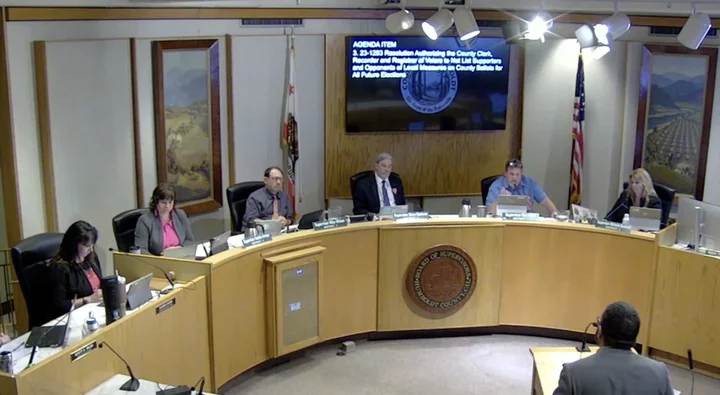
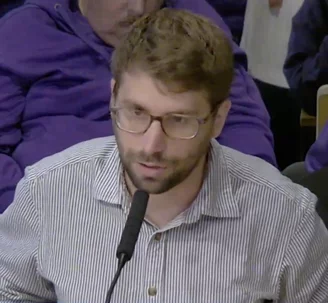
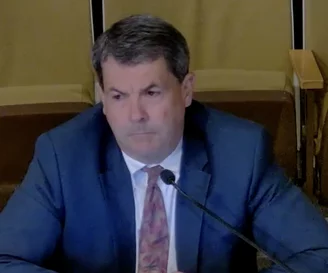
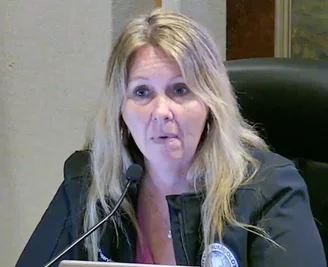
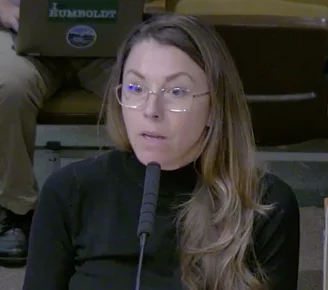
CLICK TO MANAGE